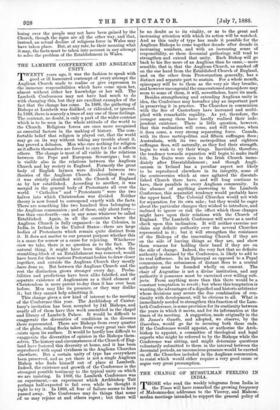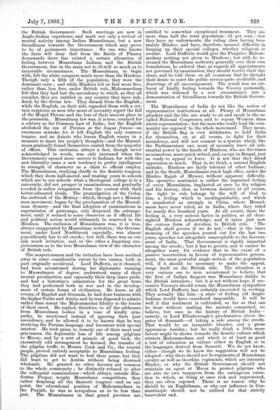11:LE CHANGE OF M1JSSULMAN FEELING IN INDIA.
THOSE who read the weekly telegrams from India in the Times will have remarked the growing frequency of Mahommedan addresses to the Viceroy, and Mahom- inedan meetings intended to support the general policy of the British Government. Such meetings are new in Anglo-Indian experience, and mark not only a revival of mental activity among Indian Mussulmans, but a new friendliness towards the Government which may prove to be of permanent importance. No one who knows the facts will deny that from the Battle of Plassey downwards there has existed a certain alienation of feeling between Mussulman Indians and the British Government, due in the main not to ill-will so much as to inexorable circumstance. The Mussulmans, to begin with, felt the white conquest much more than the Hindoos. Though only a fifth of the population, they were the dominant caste ; and while Hindoos felt at first more free, rather than less free, under British rule, Mahommed.ans felt that they had lost the ascendency to which, as they all consider, they are entitled in any country they have sub- dued, by the divine law. They shrank from the English ; while the English, on their side, regarded them with a cer- tain suspicion as men who must of necessity regret the fall of the Mogul Throne and the loss of their ancient place in the peninsula. Mussulman law was, it is true, retained for a century as the Common Law of India ; but the English abolished the use of Persian as the lingua franca—an enormous mistake, for it left English the only common tongue, and an Asiatic who learns English ceases in a measure to share his people's thoughts—and the Mussul- mans gradually found themselves ousted from the majority of offices. This exclusion, always a fact, though never acknowledged in words, was only increased when the Government opened more careers to Indians, for with the new liberality came a new tendency to prefer intelligence to strength of character as a claim to official employ. The Mussulmans, studying chiefly in the Semitic tongues, which they deem half-sacred, and wasting years in schools which are to our schools what a theological college is to a university, did not prosper in examinations, and gradually receded in sullen resignation from the contest with their better-educated rivals. The promulgation of the Codes, the outbreak of the Mutiny—which, though not a Mussul- man movement, began by the proclamation of the Mussul- man dynasty—and the final adoption of examinations in supersession of patronage, only deepened the estrange- ment, until it seemed to some observers as if official life and political action would ultimately be reserved to the Hindoos. The exclusion of Mussulmans was, it is true, always exaggerated by Mussulman irritation ; the Govern- ment, under Lord Northbrook especially, was almost punctiliously fair to all creeds ; but still, there was on one side much irritation, and on the other a lingering sus- piciousness as to the true Mussulman view of the character of British rule.
The suspiciousness and the irritation have been soothed away to some considerable extent by two causes, both in part originally accidental. Lord Dufferin, as it chanced, had been accustomed during his diplomatic training to Mussulmans of degree, understood many of their mental peculiarities, and especially their deep inner pride, and had a historian's admiration for the great feats they had performed both in war and in the develop- ment of certain forms of civilisation. He knew, at all events, of Bagdad and Granada, he had done business with the higher Turks and Arabs, and he was disposed to admire rather than resent the Mahommedan fidelity to the tenets of their creed. He replied, therefore, to all the addresses from Mussulman bodies in a tone of kindly sym- pathy, he mentioned instead of ignoring their past ascendency, and he allowed it to be known that he was studying the Persian language and literature with special interest. He took pains to remedy one of their most real grievances, the deplorable loss of life among pilgrims to Mecca ; and by a sort of miracle of good luck, the excessively odd arrangement he devised, the transfer of the pilgrim traffic to Messrs. Cook and Co.' the tourist people, proved entirely acceptable to Mussulman feeling. The pilgrims did not want to boil their pease, but they did want to get to Arabia without being drowned wholesale. He granted no other favours not common to the whole community ; he distinctly refused to alter the colloquial examinations—which always, outside Hin- dostan Proper, weight Mussulman competitors, they rather despising all the Sanscrit tongues—and on one point, the educational position of Mahommedans in the Punjab, he was so scrupulous as to be less than just. The Mussulmans in that grand province are entitled. to somewhat exceptional treatment. They are more than half the total population-51 per cent. —but they have no endowments, the ruling class having been mainly Hindoo, and have, therefore, unusual difficulty in, keeping up their special colleges, whether religious or secular. Lord Dufferin would give the Punjabee Mahom- medans nothing not given to Hindoos ; but still, he in- creased the Mussulman authority generally over their own foundations, he ordered that, as regards all appointments not governed by examination, they should receive their fair share, and he told them on all occasions that he thought their desire to enter the public service quite creditable, and. deserving of all encouragement. The result was an out- burst of kindly feeling towards the Viceroy personally, which was widened by a new circumstance into a demonstration of friendliness towards the British Govern- ment.
The Mussulmans of India do not like the notion of representative institutions at all. Plenty of Mussulman pleaders and the like are ready to sit and speak in the so- called National Congresses, and to repeat Western ideas about representation ; but the men who really lead the com- munity are opposed to the whole movement. They mean, if the British flag is ever withdrawn, to hold India for themselves, or, at all events, to fight for their ascendency, and will not consent to a system which, like the Parliamentary one, must of necessity leave all sub- stantial power in the hands of Hindoos, who are five times- as numerous, more quick-witted, and, except in Bengal, just. as ready to appeal to force. It is not that they dread oppression so much. That is, we think, a natural English mistake. Hindoos are fairly tolerant of other Indians ; and in the South, Mussulmans reach high office, under the Hindoo Rajah of Mysore, without apparent difficulty. The operative sentiment is rather the ingrained feeling of every Mussulman, implanted at once by his religion and his history, that, as between Asiatics at all events, the right to rule belongs by the will of God te him, a feeling which is inextinguishable, and which is manifested as strongly in China, where Mussul- mans have never ruled, as in India, where they ruled for nearly five hundred years. At all events, there the feeling is, a very serious factor in politics, as all clear- sighted Hindoos acknowledge, and it takes just now the curious form of devotion to British rule. 'The English shall govern if we do not,'—that is the inner meaning of the speeches poured out for the last two years, speeches not altogether unacceptable to the Govern- ment of India. That Government is rigidly impartial among the creeds; but it has to govern, and it cannot be- altogether sorry for evidence that in the event of a. passive insurrection in favour of representative govern- ment, the most powerful single section of the population will, if it should be necessary to make the appeal, range itself on the British side. The situation is a very curious one to men accustomed to believe that the first of Indian dangers was Mussulman dislike to. the British intruders ; but it is not without hope, if suc- cessive Viceroys should retain the Mussulman sympathies which Lord Dufferin has certainly succeeded in evoking. They actually like him,—a state of feeling old Anglo- Indians would have considered impossible. It will be well if this sentiment is cultivated, so far as that can be done without making the mistake committed, we believe, but once in the history of British India— namely, in Lord Ellenborough's proclamation about the- gates of Somnath—of taking a. side among the creeds. That would be an inexpiable blunder, and a gross- oppression besides ; but we really think a little more favour might be shown towards the Semitic culture which attracts Mahommedans, and which is at least as good a test of education as culture either in English or in - the languages derived from Sanscrit. We do not know, either—though we do know the suggestion will not be adopted—why there should not be regiments of Mussulman cavalry as well as Goorkha regiments, which are intensely Hindoo, or why the British Government should not maintain an agent at Mecca to protect pilgrims who.
are also its own taxpayers from the outrageous extor- tion to which, as being at once rich and unprotected, they are often exposed.. There is no reason why he should be an Englishman, or why our influence in Con- stantinople should not be utilised for that strictly benevolent end..



































 Previous page
Previous page